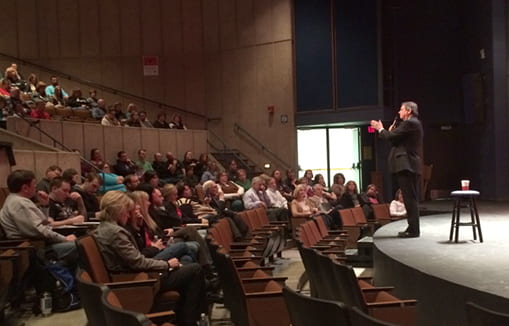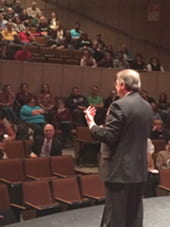Chancellor: Budget reduction is closer to $4.6m

The revenue gap facing the University of Wisconsin-Green Bay under the governor’s proposed budget will in reality be closer to $4.6 million annually than to the initial projection of $4 million, Chancellor Gary L. Miller said Friday morning (Feb. 20).
Miller addressed an audience of more than 200 faculty, staff members and students in an informational budget “town hall” session in the University Theatre.
The difference relates to inclusion of a budget provision that would trim $600,000 from UW-Green Bay’s allotment for cost-to-continue items in the second year of the biennium. Despite the new, higher figure, the Chancellor expressed confidence that UW-Green Bay administrators and campus planning groups are making headway in identifying ways to manage the impact of a reduction in state-allocated taxpayer support.
About $2 million in short-term savings has already been identified to begin to deal with the base cuts, primarily by leaving some positions vacant.
UW-Green Bay must submit an outline of its budget-reduction strategy, including potential impacts, to UW System Administration and Regents for the board meeting March 4 in Madison.
“We don’t anticipate layoffs (in the short term),” Miller told the audience, “because of what we have done to account for that first $2 million (through immediate cost containment measures).”
 He added, however, that if the full $150 million annual cut planned for the UW System is signed into law, the remainder of UW-Green Bay’s projected $4.6 million share will be a much more difficult challenge, bringing longer-term uncertainty to at least some positions and programs.
He added, however, that if the full $150 million annual cut planned for the UW System is signed into law, the remainder of UW-Green Bay’s projected $4.6 million share will be a much more difficult challenge, bringing longer-term uncertainty to at least some positions and programs.
One goal of the University’s budget-management strategy, he said, will be to garner enough flexibilities and efficiencies to buy time while “we figure out how programs can continue on their own” under new funding models.
“Worst-case, we are going to have to take $4.6 million in annual cuts. I’d like to have enough flexibility to see if some programs can generate revenue on their own… with others, it might be a matter of whether we can wait it out, ‘hold on,’ to see if the (next state) budget improves,” Miller said, or enrollment gains or other factors brighten the outlook.
The Chancellor prefaced his remarks on the budget by saying those who characterize the proposed UW System cuts as a mere 2 percent reduction are calculating from the wrong base. While the System’s total spending does exceed $6 billion annually, that figure includes federal financial aid pass-throughs to students, student fees for housing and dining, grants, gifts and other funds earmarked for specific purposes. A more realistic calculation would compare the $150 million cut to the $1 billion annual allocation from the Legislature — an amount that, combined in roughly equal proportions with student tuition revenue — underwrites most of the System’s academic offerings and personnel costs.
Miller noted that the University’s Council of Trustees, along with the Alumni Association Board of Directors, have been briefed on budget developments and are advocating on behalf of UW-Green Bay with legislators and key decision-makers, behind the scenes. He cautioned faculty, staff and students, however, that the likelihood of reducing the proposed cuts by a meaningful amount remains an uphill prospect.
“I can’t say that I’m ‘hopeful,’” Miller said, “but we’re still talking, and that’s a positive.”
Q&A: a sampling
Q. Is the spending of student segregated fees affected by the temporary campus freeze?
A. Not really. That money that has been allocated for student organization activities, programming, travel and the like should continue as planned. Students deserve those experiences, and any savings would not really be applicable for repurposing.
Q. (From a student) Didn’t a recent audit find that the UW System had a $1 billion surplus?
A. No. Incorrect. The audit made public two years ago found not a “surplus” but cash reserves or, primarily, money collected over time to pay for designated major projects. (Example at UW-Green Bay: accumulated parking fees pay for road and lot resurfacing every few years.) “The University of Wisconsin-Green Bay is not sitting on a pile of cash… The reserves we are holding (here) would get you fired, as a private-sector CEO, because they’re not large enough.”
Q. With the “public authority” proposal, won’t the devil be in the details? Why are you so sure of the value?
A. True, the proposal is not fully fleshed out. It’s possible I’ll see something that changes my mind. But, it’s not an uncommon model nationally… it is likely the state funding stream would be more consistent… and the level of over-regulation in Wisconsin is very high for a university system. Under a public authority model, “I think a university like Green Bay would compete, operate very efficiently and be successful.”
Q. Wasn’t the “Invent the Future” initiative and task-force work intended as a growth-scenario plan? And not something for a budget-cutting environment?
A. The recommendations can be viewed through either lens. (Example: Expanding graduate programs would be a revenue benefit in either case, as long as tuition revenue outpaces costs.)
Q. Isn’t the real problem the fact UW-Green Bay is relatively underfunded? Is there a chance that will change?
A. “We are underfunded — by various metrics, and (actually) just about every one.” I have started discussions with President Cross and with UW System on this topic. The initial $4 million was assigned proportionally, just to get us started with some idea of the magnitude of our cut. It’s a possibility the UW System will consider campus-by-campus factors when the final statewide reduction plan is determined.
Q. What happens if a professor’s position is ‘retired,’ not posted? Don’t offer those courses? Or hire ad hocs?
A. Deans are assessing both strategies and impacts. As far as determining which positions require filling, in the short term, enrollment growth potential and accreditation issues are priority factors at present. Delayed graduation times might be an issue when courses aren’t offered as often. Unfortunate cycle: “One of the reasons universities absorb these sort of cuts is that educators are so dedicated, it’s our nature to find a way to make things work…”
Q. (From a student) I’m getting a great education. “Even with these cuts, I know I’m valued,” but won’t students be looking at larger class sizes, a required class being offered only every other semester, or year, and taking longer to get through to your degree?
A. We can’t tell you the impact, right now. But, yes, those things are possible. “We apologize for that… but we have to make cuts to our budget.”





